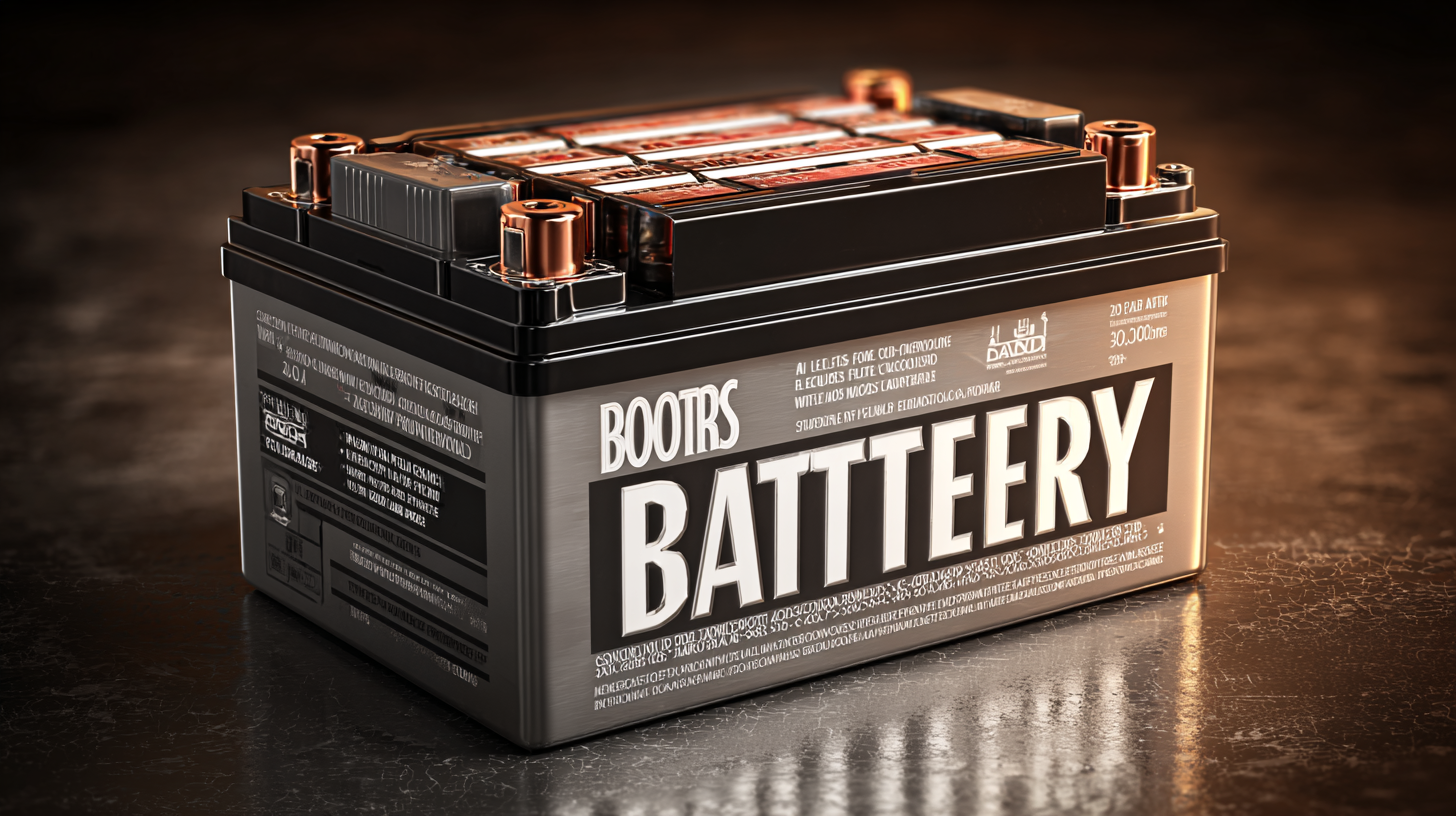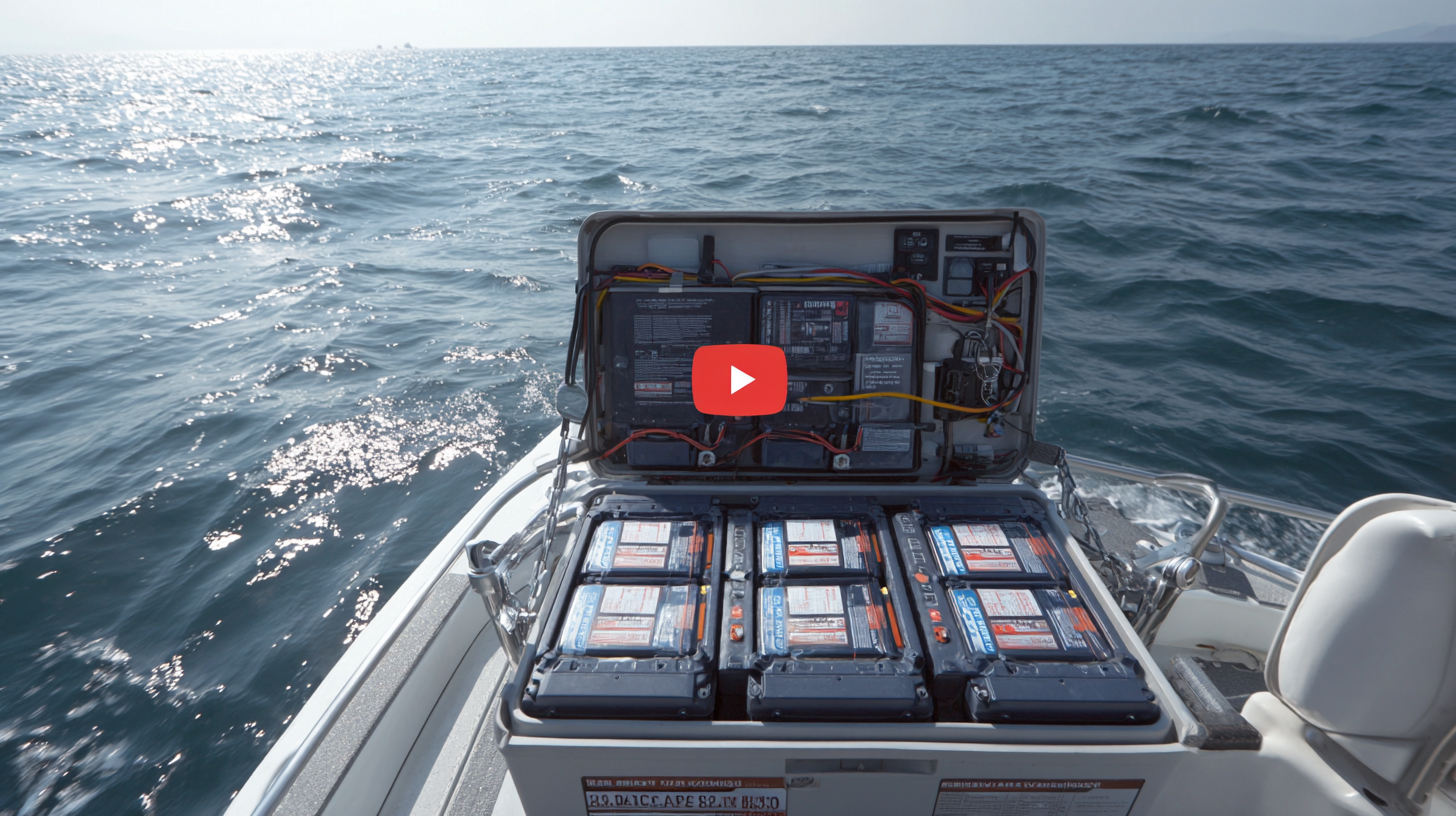Navigating the Future of Marine Power 2025 Insights on Best Boat Batteries
As the marine industry continues to evolve, the selection of reliable and efficient Boat Batteries becomes increasingly critical for optimal performance and sustainability on the water. According to a report by the National Marine Manufacturers Association, the marine battery market is projected to grow at a CAGR of over 6% from 2023 to 2028, driven by advancements in battery technology and rising environmental concerns. The demand for high-capacity, lightweight batteries that can withstand harsh marine conditions is spurring innovations from leading manufacturers, particularly those based in China, which have established themselves as key players in the global supply chain. With a commitment to quality and performance, these top factories are setting new standards and gaining trust worldwide, highlighting the importance of choosing the right Boat Batteries for navigating the future of marine power.

Exploring the Top Marine Batteries for 2025: Key Features and Specifications
As we approach 2025, the marine industry is set to experience an evolution in battery technology, catering specifically to the needs of boaters. The top marine batteries for this year are characterized by their enhanced performance, longevity, and eco-friendliness. Lithium-ion batteries have emerged as the frontrunners due to their lightweight design, impressive energy density, and minimal maintenance requirements. Boaters are particularly drawn to these batteries for their ability to deliver reliable power even in demanding conditions, making them ideal for both recreational and commercial applications.
 Moreover, advanced features like built-in management systems have become a standard expectation among new marine batteries. These systems allow for real-time monitoring of battery health and power usage, ensuring optimal performance and safety while on the water. The integration of smart technology not only enhances user experience but also maximizes efficiency, reducing the overall environmental footprint. As boating enthusiasts look forward to the adventures of 2025, investing in these top-rated marine batteries will undoubtedly empower them to navigate the waters with confidence and sustainability.
Moreover, advanced features like built-in management systems have become a standard expectation among new marine batteries. These systems allow for real-time monitoring of battery health and power usage, ensuring optimal performance and safety while on the water. The integration of smart technology not only enhances user experience but also maximizes efficiency, reducing the overall environmental footprint. As boating enthusiasts look forward to the adventures of 2025, investing in these top-rated marine batteries will undoubtedly empower them to navigate the waters with confidence and sustainability.
How to Choose the Right Battery for Your Boat: A Comprehensive Guide
When selecting the right battery for your boat, it's crucial to understand the various types available and their applications in marine environments. Lithium-ion batteries have gained popularity due to their high energy density and lightweight nature. However, recent incidents involving fires triggered by lithium-ion batteries have raised concerns regarding their safety in maritime transport. Statistics reveal that a significant percentage of maritime accidents linked to electrical failures were due to battery issues, underscoring the need for stringent safety measures.
The International Maritime Organization (IMO) plans to introduce new regulations in March 2024 to address these risks, particularly for vessels transporting electric vehicles powered by lithium batteries. This move highlights the importance of choosing a battery with robust safety features, such as thermal management systems and flame-retardant materials. Furthermore, a recent report from the Marine Battery Safety Association emphasizes that proper battery management systems can reduce the risk of incidents onboard significantly. By being informed about the latest safety standards and technology developments, boat owners can better equip themselves in making the right battery choice, ensuring both performance and safety for their vessels.
Understanding Battery Chemistry: AGM, Lithium-ion, and More
When it comes to powering your boat, understanding battery chemistry is crucial for optimizing performance and longevity. Among the most popular choices are Absorbent Glass Mat (AGM) batteries and Lithium-ion batteries. AGM batteries are renowned for their robustness, with a spill-proof design that makes them a great fit for marine environments. They can handle deep discharges and have a longer life cycle compared to traditional flooded lead-acid batteries. However, they are heavier and may not provide the same energy density as their lithium counterparts.
On the other hand, Lithium-ion batteries are gaining traction in the marine sector due to their lightweight nature and high energy density. They offer faster charging times, longer lifespan, and greater efficiency, making them ideal for modern boating applications. Additionally, they have a higher discharge rate, which is beneficial for power-hungry devices. Understanding the nuances of these battery chemistries allows boaters to make informed decisions based on their specific needs, balancing weight, capacity, and performance to ensure a seamless and enjoyable experience on the water.

Maintenance Tips to Extend the Life of Your Marine Batteries
When it comes to marine batteries, proper maintenance plays a crucial role in ensuring longevity and optimal performance.
First and foremost, regular inspections are vital. Check for corrosion on terminals and connections, which can hinder performance and lead to premature failure. Cleaning these components with a mixture of baking soda and water can effectively remove buildup and enhance conductivity. Additionally, ensure that the battery is securely mounted to minimize vibration damage, which is a common issue in marine environments.
Another essential tip is to monitor the battery's charge levels frequently. Deep-cycle batteries, commonly used in boats, should generally not be discharged below 50% of their capacity. Using a reliable battery monitor can help you keep track of the charge and prevent deep discharges that could shorten the battery's lifespan. Moreover, considering temperature effects is critical in marine settings. Storing batteries in a cool, dry place during off-season periods can mitigate damage caused by extreme temperatures, ensuring your batteries remain in peak condition when needed.
By following these maintenance tips, boaters can extend the life of their marine batteries and enhance their overall boating experience.
Innovative Technologies Shaping the Future of Marine Power Solutions
The marine power industry is rapidly evolving, driven by innovative technologies that promise to enhance energy efficiency and sustainability. As we look ahead to 2025, advancements in battery technology are set to redefine how we power our boats. Lithium-ion batteries, for instance, offer significantly higher energy density and lifespan compared to traditional lead-acid counterparts. This transition not only reduces weight but also enhances performance, allowing for longer journeys with less downtime for charging.
Tip: When selecting a battery for your boat, consider factors such as capacity, discharge rates, and maintenance requirements. Opt for lithium-ion batteries if your budget allows, as they require less maintenance and provide better performance in a compact size.
Moreover, developments in solar energy integration and hybrid power solutions are paving the way for greener maritime operations. With solar panels becoming more efficient and lightweight, boat owners can harness the sun's power to extend their cruising range without relying solely on fuel-based generators.
Tip: Explore solar panel options that can be easily mounted on your boat and investigate battery management systems that maximize the efficacy of both solar and battery power, ensuring optimal performance during your marine adventures.
